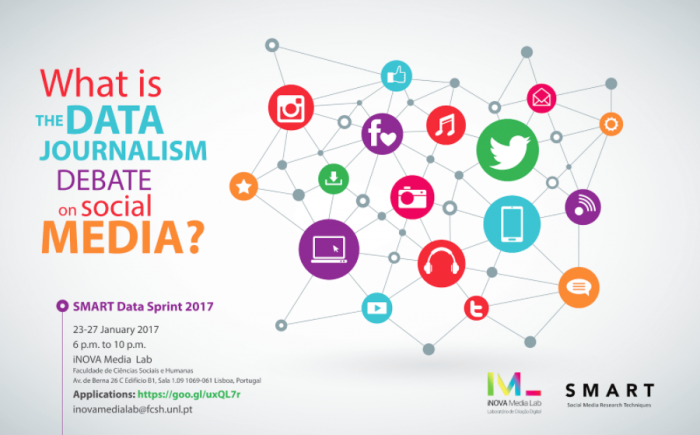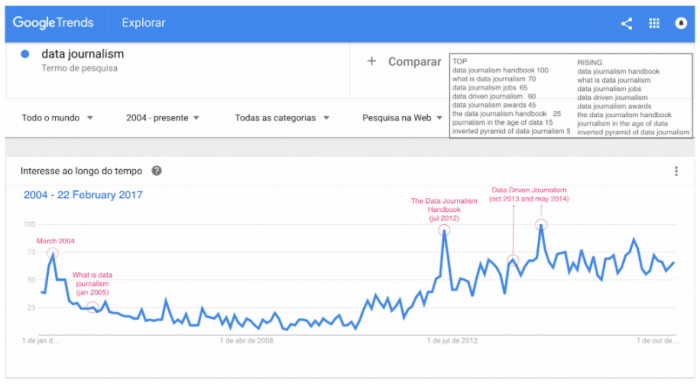SMART 2017 Theme

SMART Data Sprint is an intensive hands-on work, driven by social media data on a particular topic. The first data sprint is dedicated to current debate of Data Journalism on Social Media.
23-27 January 2017 | 6 p.m. – 10 p.m.
Venue: iNOVA Media Lab
» The Data Journalism debate on Facebook Groups: Applying Critical Analytics and Digital Methods
» Data Journalism Pages on Facebook – Is there a community?
» The representativeness of Data Journalism on Instagram
» #PanamaPapers: 48 minutes on Twitter
Facebook Group: SMART Data Sprint
For those who use Twitter, our hashtag is #SMARTdatasprint
Applications and Logistics:
The first Data Sprint is free of charge, but registration is required here:https://goo.gl/uxQL7r. Please bring your computer with microsoft excel (or similar), and we also suggest you to install Gephi (https://gephi.org/users/download/).
Organizers: Janna Joceli Omena, Elsa Caetano, Vanessa Amaral, Rodrigo Silva and Kalina Drenska.
What is the data journalism debate on social media?
Journalism has been approaching social media under several denominations, namely “computational journalism”, “data journalism”, “programmer journalism”, “data-driven journalism” (Lewis, 2014). Despite denominations, the central argument is that journalists seek for plausible findings by gleaning through large-scale datasets (to be refined, visualized, analyzed and interpreted), and they need to make sense of all that data deriving from digital information. After social media, data journalism embraces not only the most fundamental aspects of journalism – “gathering, filtering and disseminating news” (Lewis, 2014, p. 321), new tools and techniques to gather and read data, but also the awareness of usage culture, the language of the platforms (e.g. hyperlinks, hashtags, posts) and their culture as devices.Turning to Google Trends (see image below), we searched for “data journalism” to have a general view about the term, which had its first significant mentions in March 2004. After that, in 2012 we see a strong demand over the term, which was probably provoked by the release of “The Data Journalism Handbook” [1] in July 2012. From this point onwards “data journalism” turns to be a very popular search term on the web.

[Querying ‘data journalism’ on Google Trends]
We wonder how this debate about data journalism evolved on social media and what were the main topics of debate over the years. Additionally, we question to what extent hashtags, key actors and concerns are transversal to platforms.
Research Questions
+ What is data journalism debate on social media?
+ Are the hashtags/key actors/concerns transversal to the different platforms?
Analytical approach
The analytical approach relies on Rogers’ proposal of critical analytics and engagement metrics (Digital Methods Initiative, 2016, February 19; Rogers, 2016, January 13).
Platforms, Time Range, Data Details
Our initial database was composed by:
» Closed Groups: Jornalismo e Dados, Data-Driven Journalism, Introduction to Infographics
» Open Group: Jornalismo de Dados
Time range: 2012 to 2015
Data extraction: January 2016
» media and users info retrieval based on: #ddj #datajournalism #jornalismodedados #dataviz
Time range: 2010 to March 2016
» media and users info retrieval based on: #dataviz #panamapapers #ddj #datajournalism #jornalismodedados
Time range: March to April 2016
[1] The Data Journalism Handbook was born at a 48 hour workshop led by the European Journalism Centre and the Open Knowledge Foundation at MozFest 2011 in London. It subsequently spilled over into an international, collaborative effort involving dozens of data journalism’s leading advocates and best practitioners (see the first version of the book here).
References
Digital Methods Initiative (2016, February 19). Otherwise Engaged: Critical Analytics and the Meanings of Engagement (video file). Lecture given at DMI Winter School, retrieved from https://www.youtube.com/watch?v=sNwl-qGrK7M&list=PLKzQwIKtJvv_cfzQWIaVCb1H60xaeDjL
Lewis, Seth C. (2015). Journalism In An Era Of Big Data. Digital Journalism, 3:3, 321-330, DOI: 10.1080/21670811.2014.976399
Rogers, R. (2016, January 13). Otherwise Engaged: Critical Analytics and the Meanings of Engagement (slides). Retrieved from http://www.slideshare.net/digitalmethods/richard-rogers-otherwise-engaged-critical-analytics-and-the-new-meanings-of-engagement-online
